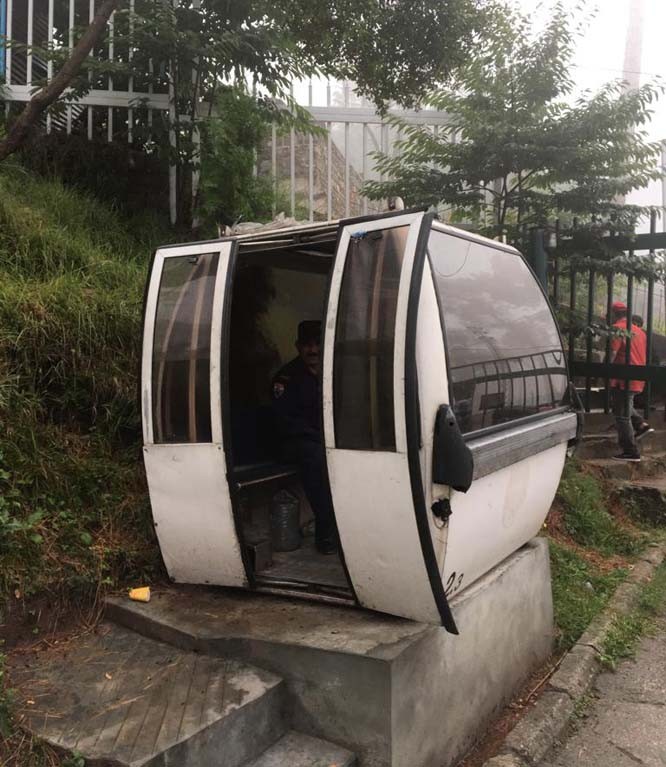
Recent accidents in Patriata and Tarbela underline the need for strict implementation of safety measures

On June 29, 2019 at around 6.30pm a severe windstorm suspended the cable car service at the famous Patriata Hill Station near Murree. The situation further worsened after the chain from a pulley slipped. It left 90 tourists, including women and children, hanging in mid-air for many hours.
"It was not expected at all. We never thought a severe windstorm would derail cable cars from the rope," Faheem Anwar, acting chief engineer of the cable car system tells The News on Sunday. "We are surrounded by mountains away from the main city and do not have a modern weather forecast system, so we do not get updates on weather."
As soon as Anwar and his team saw the windstorm coming, they immediately stopped the cable car service and started vacating chairlifts and cable car cabins. Meanwhile, "we heard that the cable cars from tower three and four had derailed from the rope," says Anwar.
He adds, "it took more than two hours to convince local people who own land on the ground to allow us to rescue people stuck in cable cars."
The length of the chairlift and cable car route is 3.3 kilometre with 1.5 kilometre of chairlift and 1.8 kilometre of cable car. Soon after the cable car leaves the station, it passes over private land or land owned by the Punjab Forest Department. The TDCP (Tourism Development Corporation of Punjab), the department managing the cable car service, has installed towers on private properties for emergency rescue and maintenance. "Locals wanted to be remunerated for their help because they knew many lives were in danger," says the chief engineer.
When the TDCP team and police failed to convince local people to start rescue operation, we called Pakistan Army that cordoned off the area to start the rescue operation. "The rescue operation lasted till midnight," says Anwar. "No doubt Pakistan Army helped us in rescuing the suspended people but most of the work was done by our own trained staff," he adds.
Such an accident is only reflective of the recklessness with which rides at recreational parks are handled. Another similar tragedy happened a few days after in Haripur District. A big boat carrying more than 50 people overturned in Tarbela Lake. More than 20 drowned and many are still missing. After hectic efforts, Pakistan Army soldiers reached the spot to help in search of the drowned people, among them were also children. Overloading was identified as the cause of this accident as well.
In every major accident at public places, Pakistan Army troops are called for rescue, posing questions on the capacity and capability of the government’s rescue services. However, civilian rescue organisations believe that the army’s help is usually needed in tragedies where operations become difficult and prolonged, and the number of rescuers is limited.
"There is need to focus on preventive and safety measures rather than on rescue operations," says a senior trainer and instructor of rescuers in a government institution. Highlighting water rescue emergency, he says, "technically such an emergency demands a quick response. If rescuers cannot reach immediately, it is almost impossible to save the victims. If a person falls in water but does not know how to swim he will die within five to six minutes. A rescue team takes time to get prepared and reach the destination after receiving a call. Actually, in water rescue emergency, most of the time, it is an operation to recover dead body."
There is need to enhance the safety standards. "In developed countries, there is focus on ensuring safety measures and standards rather than making rescue a priority," he says. Registration of boats and vehicles, their maintenance and ensuring availability of safety equipment by the local administration is a must thing to do. "Only will is required," he asserts.
The increasing number of accidents has sent a wave of fear among people. Muhammad Sajid, a frequent train traveller from Rawalpindi to Karachi, urges the government to enhance safety and rescue standards.
Similarly, a Patriata Hill Station visitor Abdul Rehman, who had come from Mirpur Khas, Sindh, to enjoy chairlifts and cable cars, was disappointed after he came to know that the service was suspended until some foreign experts come and examine it. "We knew about the accident but we thought it would have re-opened," he says. However, he adds, he would not have thought of sitting on the chairlift again if he were one of the 90 people who got stuck. He urged the administration to further improve the system and be better prepared for safety and rescue in case of accidents.